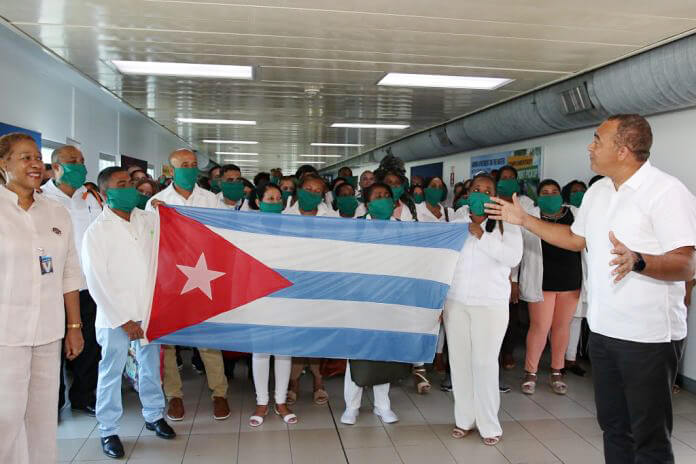Cuba has offered to assist CARICOM countries fight the illict drug trade and small arms trade.
St. Kitts and Nevis Prime Minister Dr. Denzil Douglas made this announcemnt during a news conference after the Fourth CARICOM/Cuba Summit at the National Academy for the Performing Arts (NAPA) in Port of Spain recently. He said that this was one of several points of agreement contained in the Declaration of Port of Spain.
Douglas said Cuban President Raul Castro highlighted some of the measures, which Cuba has taken to stamp out the illegal arms and drug trades and is offering to assist CARICOM countries in this regard.
In the Declaration, Castro and the CARICOM leaders expressed deep concern about the continued threats, which arms, drugs and human trafficking pose to the development efforts and social welfare of the people of the region.
Douglas, who is outgoing CARICOM chairman, said the Cuban leader also agreed to consider suggestions made by CARICOM leaders to make tertiary health facilities in Cuba more accessible to CARICOM nationals.
The Declaration reiterated the call by Castro and CARICOM leaders for the United States “to heed the overwhelming call of members of the United Nations Charter and to lift with immediate effect the unjust, economic, commercial and financial embargo imposed against the Republic of Cuba.”
In the Declaration, Castro and CARICOM leaders also renewed their commitment for continued collaboration in areas such as health, expanding trade links (specifically full implementation of the CARICOM-Cuba Trade and Economic Agreement), climate change and combat terrorism.
Hilton Trinidad was prevented from hosting the Cuba-CARICOM Summit because of the U.S. trade embargo against the communist Caribbean country.
Hilton General Manager Aly Khan said the hotel had not received permission from the U.S. authorities to have the Cubans stay at the Hilton to have the summit there.
While the Hilton is locally-owned, it is managed by the U.S. and was under U.S. laws and regulations, which required a license from the U.S. Treasury Department to host the summit.
The Trinidad and Tobago government was then forced to shift the summit to NAPA.
A statement, endorsed by Castro and the CARICOM leaders described the intervention of U.S. authorities to prevent the summit from taking place at the Hilton Trinidad as “the intrusion of the United States against the sovereignty of Trinidad and Tobago,” Douglas said.
A copy of that statement was sent to the U.S. State Department.

























